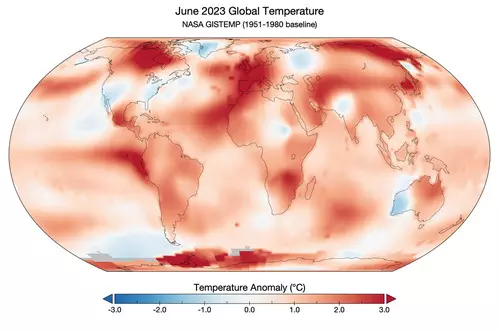
NASA, NOAA declares June 2023 to be the hottest ever on Earth
text_fieldsWashington: According to climate analyses released on Friday by the National Oceanic and Atmospheric Administration and US satellite agency NASA, June 2023 was the hottest month on record for the Earth.
June 2023 set a new record for the world's average temperature, surpassing June 2020's previous high. However, the difference (0.13 degrees Celsius) was not very large.
The average global surface (land and ocean) temperature in June was 1.05 degrees Celsius above average, ranking June 2023 as Earth's warmest June on record.
June 2023 also marked the 47th-consecutive June and the 532nd-consecutive month with temperatures above the 20th-century average.
The NOAA analysis showed that 2023 is about 100 per cent likely to rank among the 10-warmest years on record and a 97 per cent chance it will rank among the top five.
"NASA data shows last month was the hottest June on record ever. We saw the effects firsthand: poor air quality, heat-related deaths and extreme weather," Bill Nelson, NASA administrator wrote on Twitter.
NOAA scientists found that ocean surface temperature anomaly -- which indicates how much warmer or cooler temperatures are from the long-term average -- also was the highest ever recorded.
For the third consecutive month, the global ocean surface temperature hit a record high as weak El Nino conditions that emerged in May continued to strengthen in June.
Further, June 2023 set a record for the highest global monthly sea surface temperature anomaly of any month in NOAA's climate record.
The first half of 2023 ranked as the third warmest such year to date on record, with a global temperature of 1.01 degrees Celsius above the 20th-century average of 13.5 degrees Celsius.
Globally, June 2023 also saw the lowest sea ice coverage (extent) for any June on record. This primarily was a result of the record-low sea ice in the Antarctic that occurred for the second consecutive month.
Earth's global sea ice extent in June 2023 was 330,000 square miles less than the previous record low from June 2019.
Previously, Europe's Copernicus Climate Change Service (C3S), also found June 2023 to be the warmest June in their records.
It said the global ocean saw higher sea surface temperatures than any previous June on record and throughout the month, the daily Antarctic sea ice extent remained at unprecedented low values for the time of year.
Antarctic sea ice reached its lowest extent for June since satellite observations began, at 17 per cent below average, breaking the previous June record by a substantial margin.
Arctic sea ice extent was slightly below average but well above the June values from the past eight years.
With inputs from IANS























